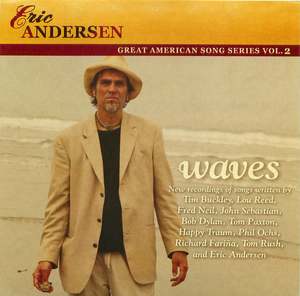
Waves
produced by Robert Aaron; performed by Eric Andersen, 1943- (Appleseed, 2005), 55 mins, 13 page(s)
Details
- Field of Interest
- American Music
- Content Type
- Music recording
- Duration
- 55 mins
- Recording Engineer
- Andy Grassi
- Format
- Audio
- Sub Genre
- Contemporary Folk, Folk-Rock
- Label
- Appleseed
- Page Count
- 13
- Performer
- Eric Andersen, 1943-
- Producer
- Robert Aaron
- Release Date
- 2005
- Review
- The folk music movement centered in New York's Greenwich Village in the early 1960s, although it was steeped in traditional repertoire, it quickly focused on new, original songs written by the performers themselves, songs that explored mature personal concerns and commented on the social and political issues of the day. Eric Andersen was a part of that movement while it was happening, so his "Great American Song Series," the second volume of which is called Waves (following the first volume, 2004's The Street Was Always There) represents a participant interpreting the compositions of his peers. Unlike, say, Rod Stewart recording his Great American Songbook series of pre-rock standards with little sense of what those songs were about, this is more what you might get if, for example, Hoagy Carmichael had made an album of the songs of Cole Porter, Irving Berlin, and George Gershwin. In fact, that comparison is particularly apt because Carmichael, though of the same generation as those songwriters, was actually just a little younger, which is also true of Andersen, who was born after, but within a few years, of every songwriter he covers on this album except John Sebastian (and Sebastian is less than a year younger). Andersen may have been closest to Phil Ochs personally among these musical friends, but he did not share Ochs' focus on politics, which tended to make his interpretations of songs like "I Ain't Marching Anymore" on The Street Was Always There less than convincing. Here, he sticks to Ochs' sad, lovely, and apolitical "Changes," to which he is much more suited. But he shows the greatest affinity for moody, introspective singer/songwriters like Tim Buckley ("Once I Was") and Fred Neil ("I've Got a Secret"), recalling their phrasing while adding his own style as a gloss. (Similarly, the Neil and Tim Hardin songs provided the best moments on The Street Was Always There.) Andersen himself probably wouldn't claim to have improved upon the original artists' versions of these songs, but covering them provides a different perspective, brings them up to date, and may help rescue some of them from obscurity. "If Eric has done his job," writes annotator Robbie Woliver, "I hope you will trek down to your local record store ...." As the two albums appear to have been recorded at the same sessions, this is probably the end of Andersen's musical reminiscence, and he seems to have covered the obvious bases. Still, there's more where these came from, and there are still a few people (Richie Havens and Mark Spoelstra, to name two) so far unrepresented, so a third volume would not be amiss. ~ William Ruhlmann, All Music Guide
- Subject
- American Music, Music & Performing Arts, American Studies, Rock Music, Rock Music, Música Rock
- Keywords and Translated Subjects
- Rock Music, Música Rock
